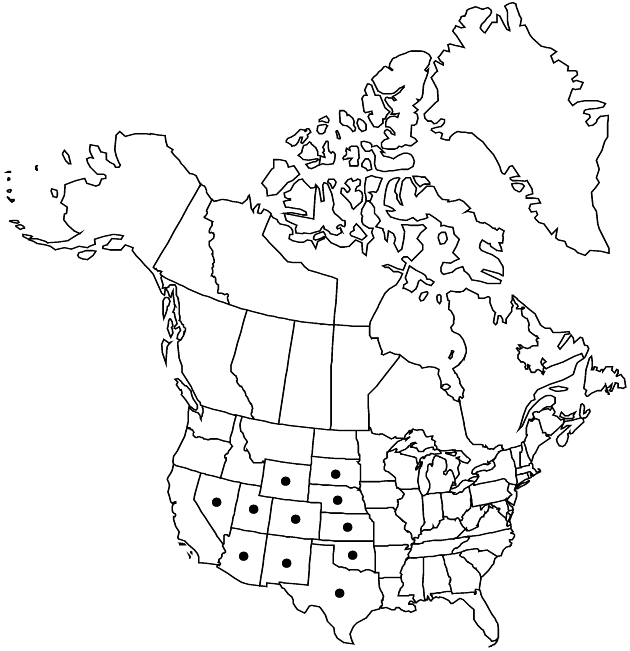Difference between revisions of "Artemisia filifolia"
Ann. Lyceum Nat. Hist. New York 2: 211. 1827.
FNA>Volume Importer |
FNA>Volume Importer |
||
| Line 12: | Line 12: | ||
|name=Artemisia plattensis | |name=Artemisia plattensis | ||
|authority=Nuttall | |authority=Nuttall | ||
| − | }}{{Treatment/ID/Synonym | + | }} {{Treatment/ID/Synonym |
|name=Oligosporus filifolius | |name=Oligosporus filifolius | ||
|authority=(Torrey) Poljakov | |authority=(Torrey) Poljakov | ||
| Line 30: | Line 30: | ||
|elevation=500–2000 m | |elevation=500–2000 m | ||
|distribution=Ariz.;Colo.;Kans.;Nebr.;Nev.;N.Mex.;Okla.;S.Dak.;Tex.;Utah;Wyo. | |distribution=Ariz.;Colo.;Kans.;Nebr.;Nev.;N.Mex.;Okla.;S.Dak.;Tex.;Utah;Wyo. | ||
| − | |discussion=<p>One of the more easily distinguished of the shrubby Artemisia species, A. filifolia occurs in sandy soils and cohabits with species of Yucca, Cactaceae, and Salvia dorrii, the purple sage of western literary fame. Its filiform leaves and faintly aromatic foliage distinguish it from members of subg. Tridentatae.</p> | + | |discussion=<p>One of the more easily distinguished of the shrubby <i>Artemisia</i> species, <i>A. filifolia</i> occurs in sandy soils and cohabits with species of <i>Yucca</i>, <i>Cactaceae</i>, and Salvia dorrii, the purple sage of western literary fame. Its filiform leaves and faintly aromatic foliage distinguish it from members of subg. Tridentatae.</p> |
|tables= | |tables= | ||
|references= | |references= | ||
| Line 54: | Line 54: | ||
|publication year=1827 | |publication year=1827 | ||
|special status= | |special status= | ||
| − | |source xml=https://jpend@bitbucket.org/aafc-mbb/fna-data-curation.git/src/ | + | |source xml=https://jpend@bitbucket.org/aafc-mbb/fna-data-curation.git/src/8f726806613d60c220dc4493de13607dd3150896/coarse_grained_fna_xml/V19-20-21/V19_857.xml |
|tribe=Asteraceae tribe Anthemideae | |tribe=Asteraceae tribe Anthemideae | ||
|genus=Artemisia | |genus=Artemisia | ||
Revision as of 15:15, 18 September 2019
Shrubs, 60–180 cm (rounded), faintly aromatic. Stems green or gray-green, wandlike (usually slender, curved, sometimes stout and stunted in harsh habitats), glabrous or sparsely hairy. Leaves gray-green; blades linear if entire, obovate if lobed, (1.5–)2–5(–6) × 0.1–2.5 cm, entire to 3-lobed, lobes filiform (less than 1 mm wide), apices acute, glabrous or sparsely hairy. Heads (mostly sessile) in paniculiform arrays 8–15(–17) × 2–4(–5) cm (branches erect to somewhat recurved). Involucres globose, 1.5–2 × 1.5–2 mm. Phyllaries (ovate, inconspicuous, margins scarious) densely hairy. Florets: pistillate 1–4; functionally staminate 3–6; corollas pale yellow, 1–1.5 mm, glabrous. Cypselae oblong (distally incurved-falcate and oblique), 0.2–0.5 mm, obscurely nerved, glabrous. 2n = 18.
Phenology: Flowering late summer–early winter.
Habitat: Open prairies, dunes, sandy soils
Elevation: 500–2000 m
Distribution

Ariz., Colo., Kans., Nebr., Nev., N.Mex., Okla., S.Dak., Tex., Utah, Wyo.
Discussion
One of the more easily distinguished of the shrubby Artemisia species, A. filifolia occurs in sandy soils and cohabits with species of Yucca, Cactaceae, and Salvia dorrii, the purple sage of western literary fame. Its filiform leaves and faintly aromatic foliage distinguish it from members of subg. Tridentatae.
Selected References
None.